Statistics published by the Office of Rail and Road (ORR) show that for the four weeks between 5 February and 4 March, TransPennine Express’ cancellation score worsened from 7.2% to 23.8% when adjusted to include pre-cancellations due to a shortage of available train crew.
TPE fully pre-cancelled (P*-coded) 1,093 and part pre-cancelled 532 trains for this reason.
In response, a spokesperson for TransPennine Express said: “The combined impact of prolonged higher-than-usual sickness levels, a significant driver training programme to facilitate the delivery of the Transpennine Route Upgrade and an aligned lack of a driver overtime agreement, has led to the need to remove a number of services from the timetable on a day-by-day basis through pre-planned cancellations.
“These decisions are not taken lightly, and pre-planned cancellations are only applied (in accordance with current industry guidelines) when resources are not available to cover advertised services, and to give advance notice of service changes for customers. Following ORR instruction, the rail industry as a whole is currently looking at how relatively late notice amendments to services can be made more customer friendly.
“When services are cancelled in advance, TPE ensures these are represented in industry systems, as well as Journeycheck via its website, to give customers as much information as possible. Delay Repay is available in relation to all pre-planned cancellations, via the TPE website, as these are treated in the same way as on-the-day cancellations. These cancellations are also reported to ORR and have been for several months. Our aim is to be as open and transparent as possible, and to give our customers the information they need to be able to make informed choices about their travel arrangements.”
ORR has instructed the rail industry to change how they record ‘pre-cancellations’ and to introduce a more passenger-friendly and transparent way of working when making late changes to services.
A suitable plan has yet to be implemented and until the practice ceases, ORR will continue to publish this data to ensure full transparency.
Feras Alshaker, Director, Planning & Performance, said: “Until we are satisfied that official statistics reflect passenger experiences, we will make sure that information on service reliability is available for passengers and stakeholders.
“We acknowledge that ongoing strike action has led to a refocusing of resources elsewhere, but this should not deflect from the fact that this needs to be sorted as a matter of urgency.
“We’ll continue to publish pre-cancellation data until we’re satisfied and should we not have a satisfactory plan from industry by the end of April, we will consider imposing a change in the way these services are recorded.”
Of the 24 train operators in Britain, eight reported recording resource availability shortage (P*-coded) pre-cancellations and are included in the statistics published today.
Northern Trains and ScotRail reported significant numbers of full pre-cancelled services due to a shortage of available train crew, at 380 and 159 respectively.
TfW recorded 98 full and 159 part pre-cancellations due to a shortage of available trains.
As a result of the inclusion of “P*-coded” pre-cancellations, the national cancellations score increased by 0.4 percentage points in the latest period to 3.3%.
- Passenger rail performance: cancellations data – Rail period 12 (5 February 2023 to 4 March 2023) factsheet.
- “Pre-cancellation” is often referred to as “P*-coding”. This is a generic, colloquial term for cancellations made before the day where the train is removed from the timetable.
Photo credit: ORR







































 0113 2082620
0113 2082620 info@railbusinessdaily.com
info@railbusinessdaily.com 15 Mariner Court, Wakefield WF4 3FL
15 Mariner Court, Wakefield WF4 3FL

